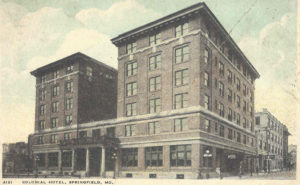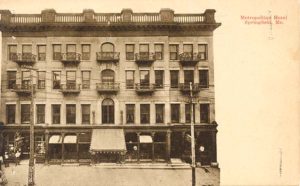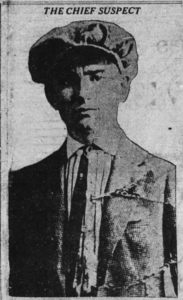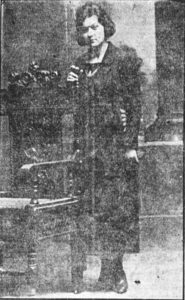
Arthur J. Seigfreid was ready to go home. A salesman for a Kansas City jewelry company, Arthur had been in Springfield for a few days, making the rounds to all the local jewelry stores. Now it was just two days before Christmas and he had his train ticket in hand. At around 3:00 p.m., he paid his bill at the front desk of the Colonial Hotel and headed back to his fourth-floor room. He just needed to grab his jewelry trunks and the presents he had bought for his two children and he could be on his way to the train station.
Arthur didn’t make it to the train station. When he arrived back at his room, he discovered an intruder already there, a man, trying to open his jewelry trunk. The two men struggled and the would-be thief shot Arthur in the face. The intruder ran, and Arthur staggered out of his room to search for help. A hotel employee found him on the second-floor stairway, where he had collapsed. He was “bleeding profusely” and was rushed to the Springfield hospital, where he died two hours later.
Shortly before he died, Seigfreid reportedly said that “they were trying to rob me and they shot me.” He died without giving any additional information. The police investigation discovered that his room was in disarray, indicating a struggle. According to his employer, the C. A. Kiger Jewelry Company, Siegfried had in his possession $10,000 of inventory, mostly in diamonds. Surprising, nothing appeared to be missing.
By the next evening police had a suspect in custody—a 22-year-old woman who identified herself as Mrs. Beryl Lloyd Brenner, wife of Fred Brenner. Mrs. Brenner was believed to be an accomplice of Fred and another man, both suspected of the attempted robbery and murder of Arthur Seigfreid. Mrs. Brenner was arrested in her room at the Metropolitan Hotel on College Street. After continued questioning by the police, Beryl admitted that she was not married to Fred, and in fact, had only recently met him.

Brenner was not the smartest of thieves; he gave himself away by registering as a guest at the Colonial and then asking employees if there were any silk or jewelry salesmen also staying there. Brenner was travelling light; he registered with no luggage and investigators found only “two hats and an overcoat” in his room.
According to detectives, Beryl and Fred Brenner had checked into the Colonial Hotel together on December 15, but checked out and moved to the Metropolitan Hotel just two days later. Fred Brenner returned to the Colonial a few days later and checked in again, this time alone. Shortly after the shooting, an elevator operator reported seeing Brenner return to his room in an “excited” and “flushed condition.” That was the last time he was seen in the hotel. Beryl had also been seen at the Colonial Hotel shortly after the shooting, and even rode in the elevator with the two detectives working on the case.
After two days of sitting in the county jail, the former Mrs. Beryl Lloyd Brenner was finally in the mood to talk. On Christmas Day, she confessed that her real name was Glen Mumford Bailie. She had met Brenner, whose real name was Rowland Lee, in Cincinnati a few months prior to their arrival in Springfield. She claimed that Lee’s accomplice was a man known as “Boogher” Bertram, someone they had met in St. Louis. The three were on their way to Tulsa, but had stopped in Springfield because they were low on funds.

Police in several cities across the Midwest helped search for the fugitives. There was a possible sighting at Clinton, Missouri, where they may have been seen boarding a train. However, Springfield police chief D. C. Welch believed the men were likely headed for the Mexican border and asked El Paso border officials to watch for them.
Miss Bailie believed that the two men would never be found. Bertram, she claimed “was the brains” of the operation. Lee, on the other hand, “had cast iron nerves but not an ounce of brains.” What Lee apparently had was charisma, which Bailie said made him the leader and enabled him “to exert a supernatural influence over Bertram and myself.”

In early 1921, Lee and Bertram had still not been located and Bailie was charged with accessory to murder. Her bail was set at $5000. A group of local women wanted it reduced, but prosecuting attorney O. J. Page refused, pointing out that Bailie knew the men she traveled with were “stick-up men” and therefore she could not be trusted. It wasn’t until late May that Bailie’s attorney, Fred A. Moon, had her bond reduced and she was finally released after spending five month in the Greene County jail. By July, the charges against her were dropped and she was on her way to New York to stay with her “half-brother, Maxwell Hoblitchell.”
Rowland Lee and “Booge” Bertram were never apprehended.

Leave a Reply